Industrial Relations Theory: Dunlop, Institutionalism, Corporatism
VerifiedAdded on 2023/01/16
|13
|3389
|27
Report
AI Summary
This report delves into the realm of industrial relations, examining the interplay between workers and management within the industry. It explores the significance of employee relations in contemporary business settings, highlighting their impact on organizational operations, occupational health, and safety. The study primarily focuses on comparing and contrasting Dunlop's theory, Institutionalism theory, and Corporatist theory, while also considering the Pluralistic approach to industrial relations. The analysis includes a comparative evaluation of Dunlop's and Institutionalist theories within the context of Fiji's employment relations environment, assessing their respective advantages and disadvantages. The report further investigates the application of these theories, particularly in relation to the tourism and logistics industries, and their potential for fostering social engagement and addressing economic challenges in Fiji. Moreover, it critically examines the impact of these theories on Fiji's labor standards and employment relations, evaluating their strengths and weaknesses. The report also discusses the advantages and disadvantages of Dunlop and Institutional theories in the context of Fiji's industrial environment.
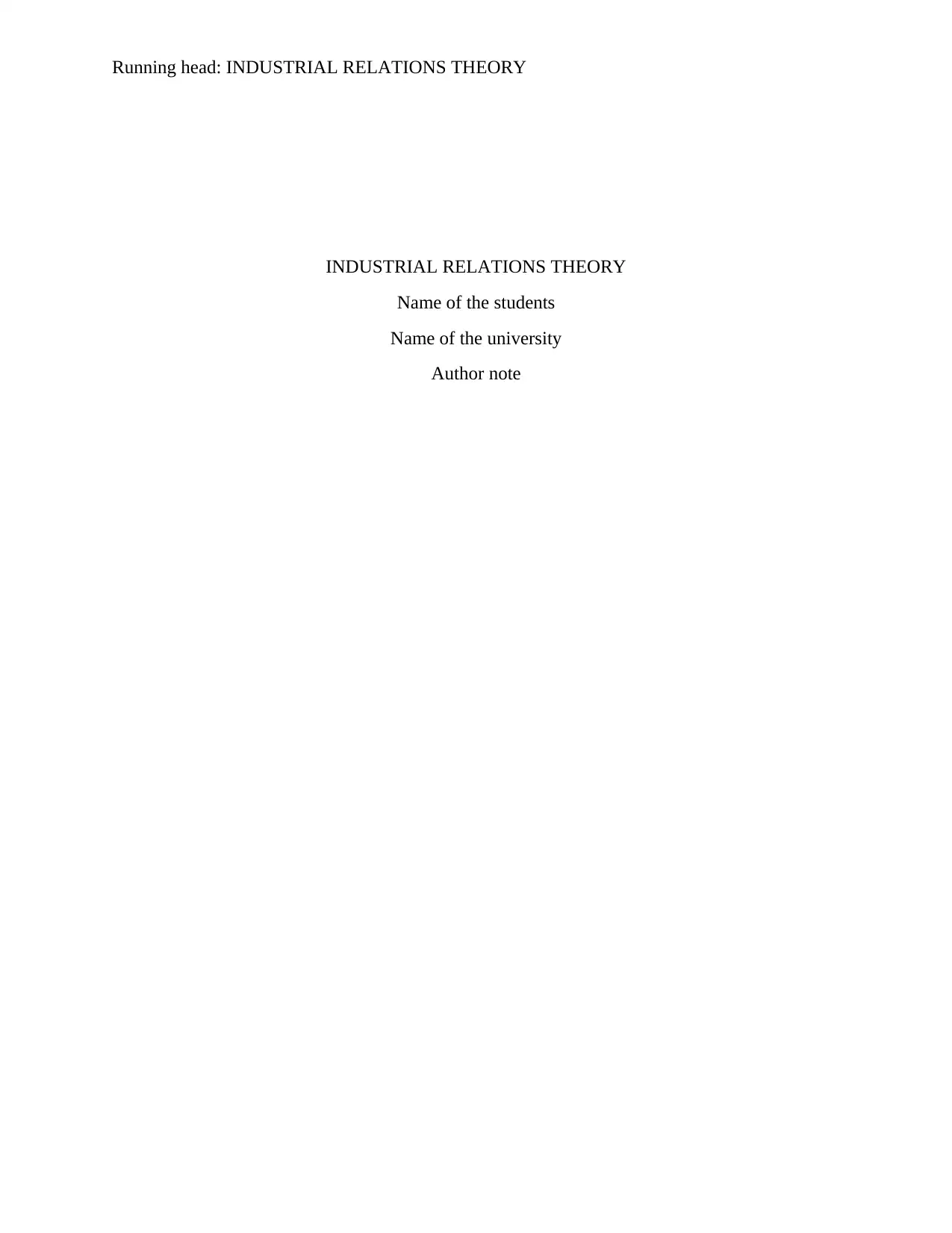
Running head: INDUSTRIAL RELATIONS THEORY
INDUSTRIAL RELATIONS THEORY
Name of the students
Name of the university
Author note
INDUSTRIAL RELATIONS THEORY
Name of the students
Name of the university
Author note
Paraphrase This Document
Need a fresh take? Get an instant paraphrase of this document with our AI Paraphraser
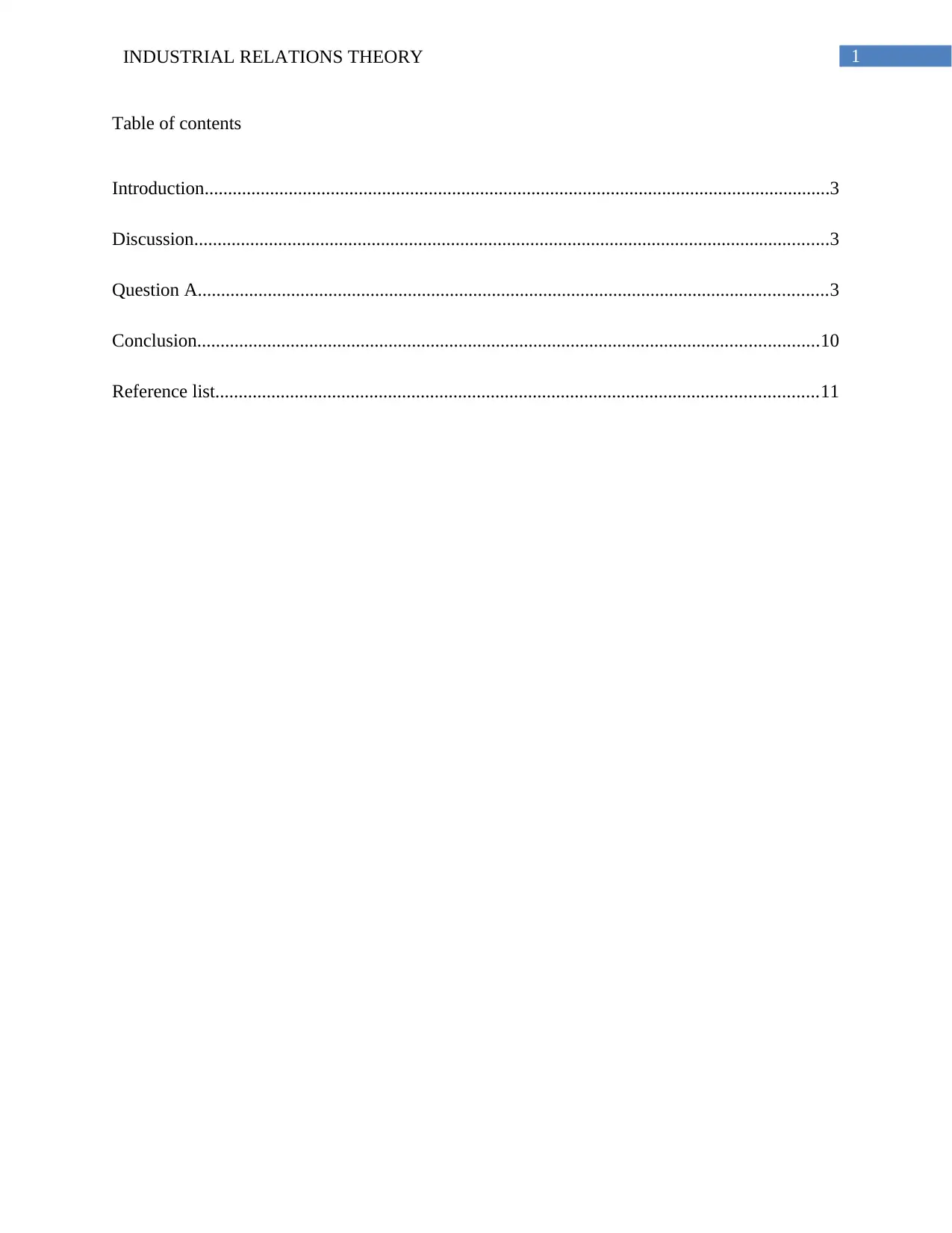
1INDUSTRIAL RELATIONS THEORY
Table of contents
Introduction......................................................................................................................................3
Discussion........................................................................................................................................3
Question A.......................................................................................................................................3
Conclusion.....................................................................................................................................10
Reference list.................................................................................................................................11
Table of contents
Introduction......................................................................................................................................3
Discussion........................................................................................................................................3
Question A.......................................................................................................................................3
Conclusion.....................................................................................................................................10
Reference list.................................................................................................................................11
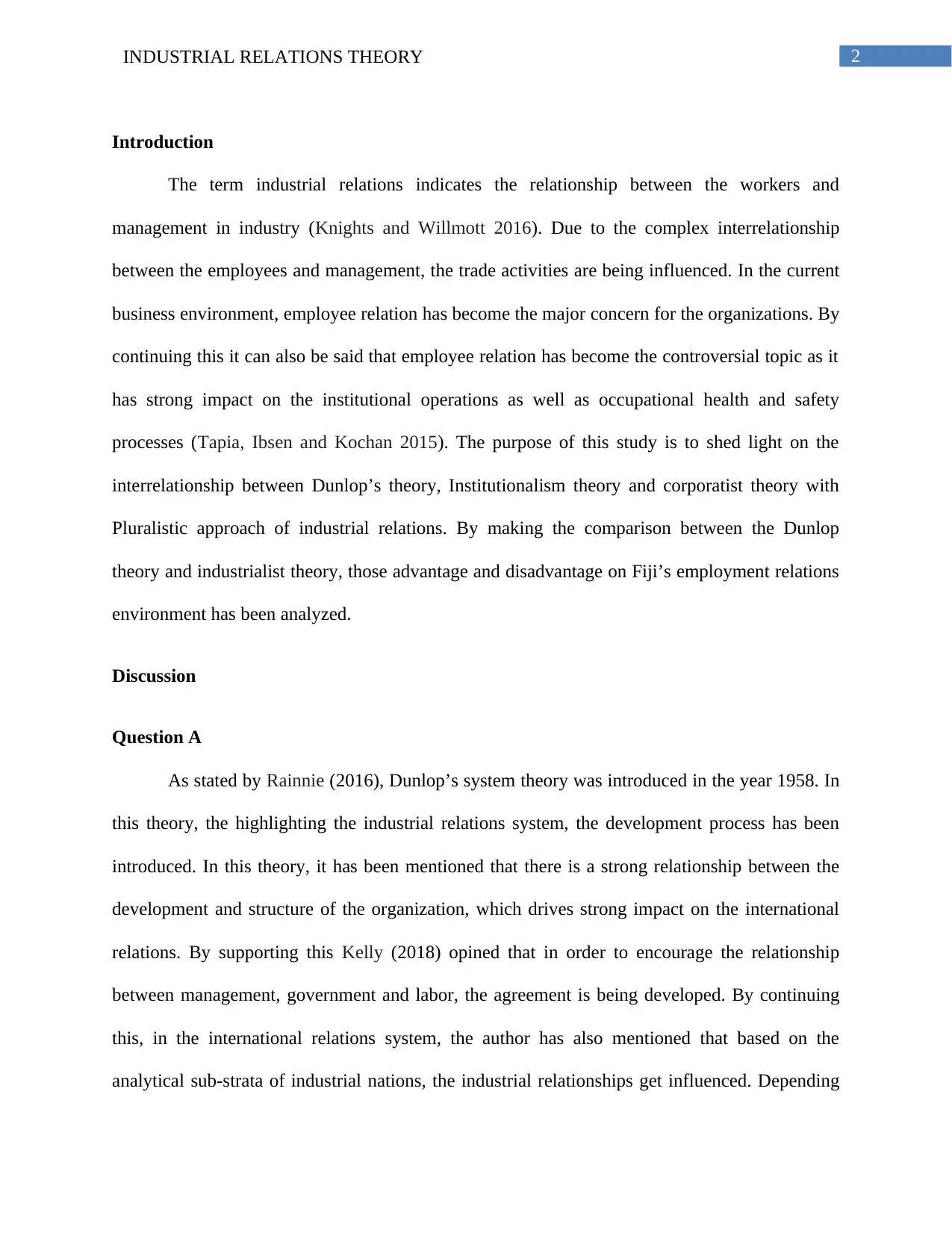
2INDUSTRIAL RELATIONS THEORY
Introduction
The term industrial relations indicates the relationship between the workers and
management in industry (Knights and Willmott 2016). Due to the complex interrelationship
between the employees and management, the trade activities are being influenced. In the current
business environment, employee relation has become the major concern for the organizations. By
continuing this it can also be said that employee relation has become the controversial topic as it
has strong impact on the institutional operations as well as occupational health and safety
processes (Tapia, Ibsen and Kochan 2015). The purpose of this study is to shed light on the
interrelationship between Dunlop’s theory, Institutionalism theory and corporatist theory with
Pluralistic approach of industrial relations. By making the comparison between the Dunlop
theory and industrialist theory, those advantage and disadvantage on Fiji’s employment relations
environment has been analyzed.
Discussion
Question A
As stated by Rainnie (2016), Dunlop’s system theory was introduced in the year 1958. In
this theory, the highlighting the industrial relations system, the development process has been
introduced. In this theory, it has been mentioned that there is a strong relationship between the
development and structure of the organization, which drives strong impact on the international
relations. By supporting this Kelly (2018) opined that in order to encourage the relationship
between management, government and labor, the agreement is being developed. By continuing
this, in the international relations system, the author has also mentioned that based on the
analytical sub-strata of industrial nations, the industrial relationships get influenced. Depending
Introduction
The term industrial relations indicates the relationship between the workers and
management in industry (Knights and Willmott 2016). Due to the complex interrelationship
between the employees and management, the trade activities are being influenced. In the current
business environment, employee relation has become the major concern for the organizations. By
continuing this it can also be said that employee relation has become the controversial topic as it
has strong impact on the institutional operations as well as occupational health and safety
processes (Tapia, Ibsen and Kochan 2015). The purpose of this study is to shed light on the
interrelationship between Dunlop’s theory, Institutionalism theory and corporatist theory with
Pluralistic approach of industrial relations. By making the comparison between the Dunlop
theory and industrialist theory, those advantage and disadvantage on Fiji’s employment relations
environment has been analyzed.
Discussion
Question A
As stated by Rainnie (2016), Dunlop’s system theory was introduced in the year 1958. In
this theory, the highlighting the industrial relations system, the development process has been
introduced. In this theory, it has been mentioned that there is a strong relationship between the
development and structure of the organization, which drives strong impact on the international
relations. By supporting this Kelly (2018) opined that in order to encourage the relationship
between management, government and labor, the agreement is being developed. By continuing
this, in the international relations system, the author has also mentioned that based on the
analytical sub-strata of industrial nations, the industrial relationships get influenced. Depending
⊘ This is a preview!⊘
Do you want full access?
Subscribe today to unlock all pages.

Trusted by 1+ million students worldwide
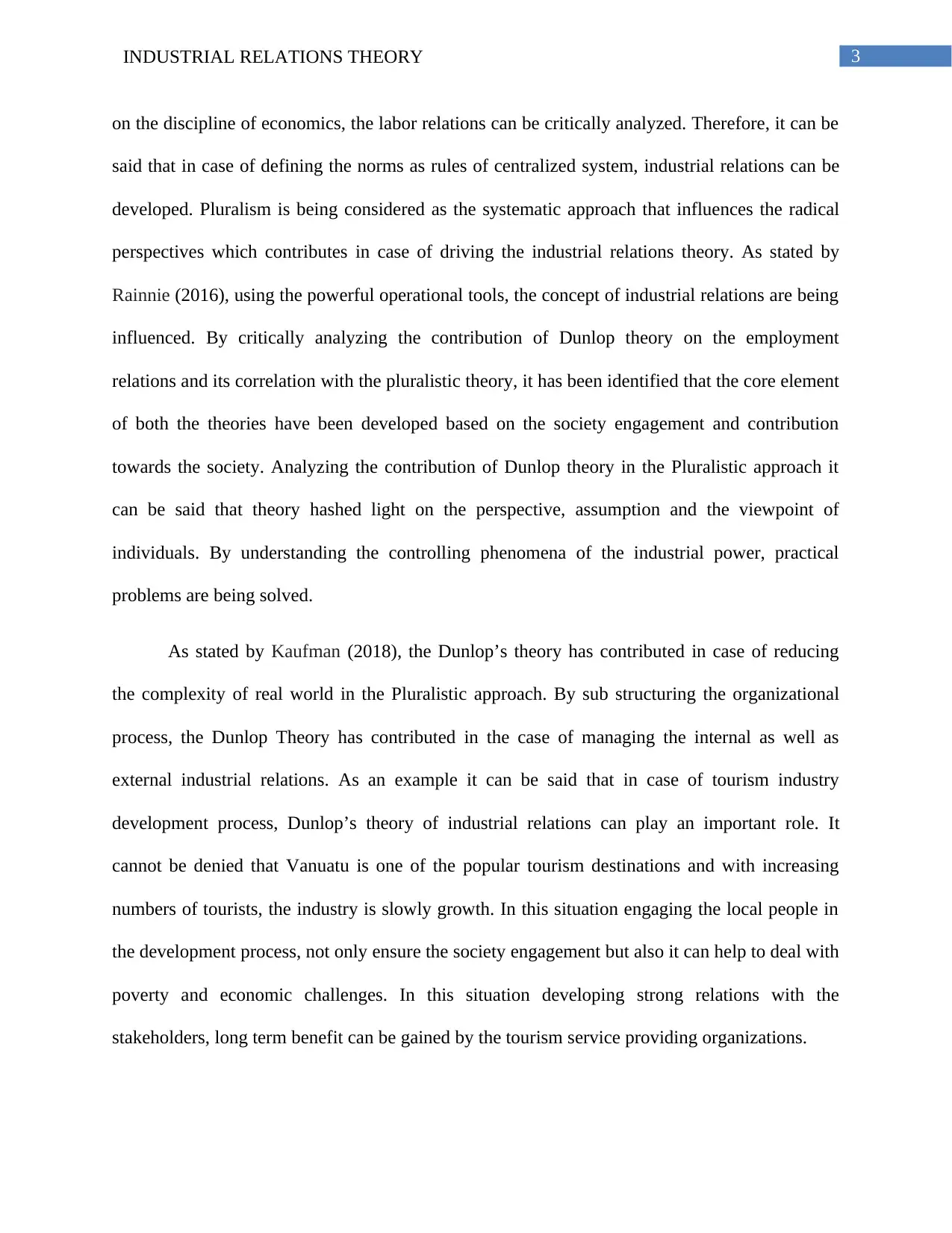
3INDUSTRIAL RELATIONS THEORY
on the discipline of economics, the labor relations can be critically analyzed. Therefore, it can be
said that in case of defining the norms as rules of centralized system, industrial relations can be
developed. Pluralism is being considered as the systematic approach that influences the radical
perspectives which contributes in case of driving the industrial relations theory. As stated by
Rainnie (2016), using the powerful operational tools, the concept of industrial relations are being
influenced. By critically analyzing the contribution of Dunlop theory on the employment
relations and its correlation with the pluralistic theory, it has been identified that the core element
of both the theories have been developed based on the society engagement and contribution
towards the society. Analyzing the contribution of Dunlop theory in the Pluralistic approach it
can be said that theory hashed light on the perspective, assumption and the viewpoint of
individuals. By understanding the controlling phenomena of the industrial power, practical
problems are being solved.
As stated by Kaufman (2018), the Dunlop’s theory has contributed in case of reducing
the complexity of real world in the Pluralistic approach. By sub structuring the organizational
process, the Dunlop Theory has contributed in the case of managing the internal as well as
external industrial relations. As an example it can be said that in case of tourism industry
development process, Dunlop’s theory of industrial relations can play an important role. It
cannot be denied that Vanuatu is one of the popular tourism destinations and with increasing
numbers of tourists, the industry is slowly growth. In this situation engaging the local people in
the development process, not only ensure the society engagement but also it can help to deal with
poverty and economic challenges. In this situation developing strong relations with the
stakeholders, long term benefit can be gained by the tourism service providing organizations.
on the discipline of economics, the labor relations can be critically analyzed. Therefore, it can be
said that in case of defining the norms as rules of centralized system, industrial relations can be
developed. Pluralism is being considered as the systematic approach that influences the radical
perspectives which contributes in case of driving the industrial relations theory. As stated by
Rainnie (2016), using the powerful operational tools, the concept of industrial relations are being
influenced. By critically analyzing the contribution of Dunlop theory on the employment
relations and its correlation with the pluralistic theory, it has been identified that the core element
of both the theories have been developed based on the society engagement and contribution
towards the society. Analyzing the contribution of Dunlop theory in the Pluralistic approach it
can be said that theory hashed light on the perspective, assumption and the viewpoint of
individuals. By understanding the controlling phenomena of the industrial power, practical
problems are being solved.
As stated by Kaufman (2018), the Dunlop’s theory has contributed in case of reducing
the complexity of real world in the Pluralistic approach. By sub structuring the organizational
process, the Dunlop Theory has contributed in the case of managing the internal as well as
external industrial relations. As an example it can be said that in case of tourism industry
development process, Dunlop’s theory of industrial relations can play an important role. It
cannot be denied that Vanuatu is one of the popular tourism destinations and with increasing
numbers of tourists, the industry is slowly growth. In this situation engaging the local people in
the development process, not only ensure the society engagement but also it can help to deal with
poverty and economic challenges. In this situation developing strong relations with the
stakeholders, long term benefit can be gained by the tourism service providing organizations.
Paraphrase This Document
Need a fresh take? Get an instant paraphrase of this document with our AI Paraphraser
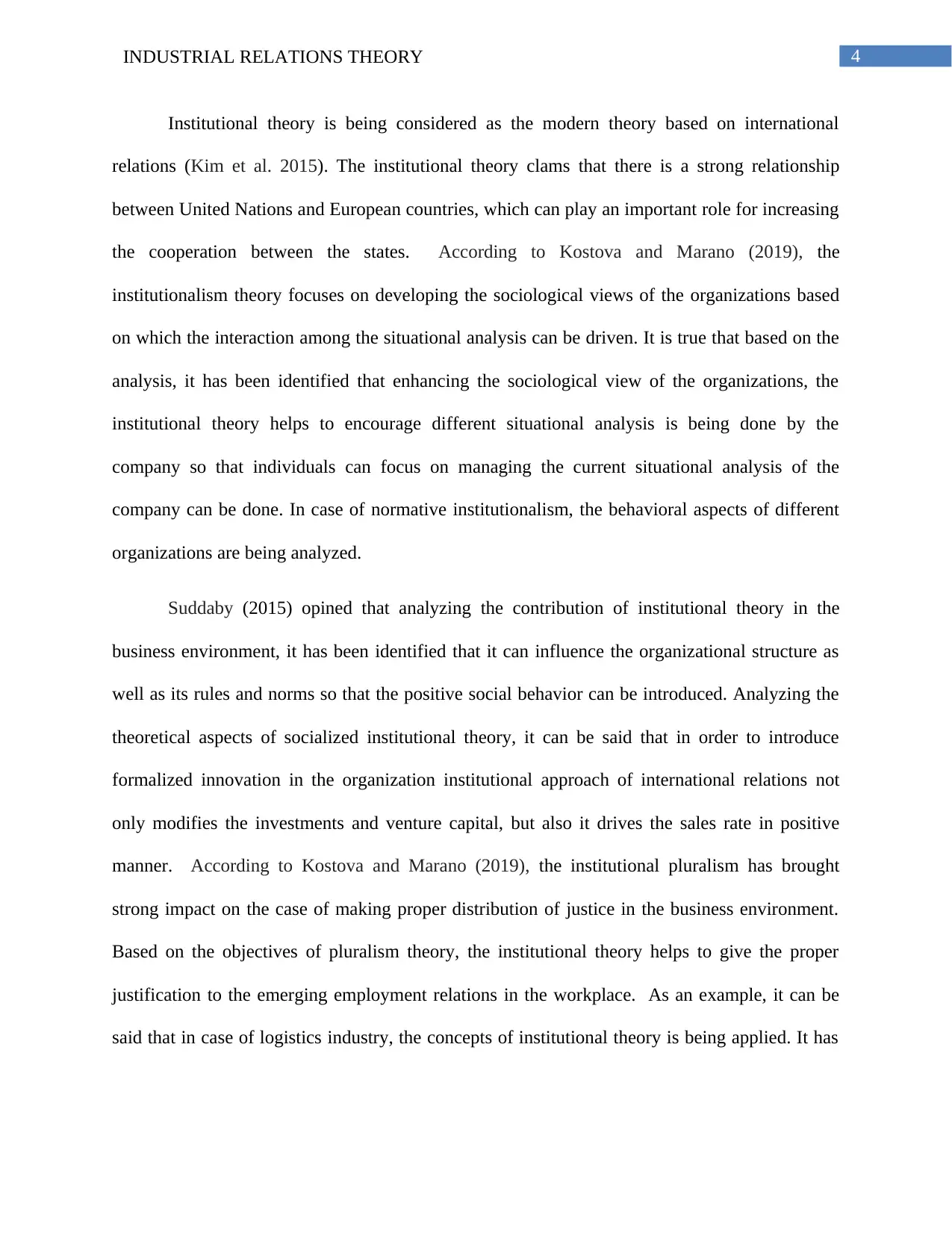
4INDUSTRIAL RELATIONS THEORY
Institutional theory is being considered as the modern theory based on international
relations (Kim et al. 2015). The institutional theory clams that there is a strong relationship
between United Nations and European countries, which can play an important role for increasing
the cooperation between the states. According to Kostova and Marano (2019), the
institutionalism theory focuses on developing the sociological views of the organizations based
on which the interaction among the situational analysis can be driven. It is true that based on the
analysis, it has been identified that enhancing the sociological view of the organizations, the
institutional theory helps to encourage different situational analysis is being done by the
company so that individuals can focus on managing the current situational analysis of the
company can be done. In case of normative institutionalism, the behavioral aspects of different
organizations are being analyzed.
Suddaby (2015) opined that analyzing the contribution of institutional theory in the
business environment, it has been identified that it can influence the organizational structure as
well as its rules and norms so that the positive social behavior can be introduced. Analyzing the
theoretical aspects of socialized institutional theory, it can be said that in order to introduce
formalized innovation in the organization institutional approach of international relations not
only modifies the investments and venture capital, but also it drives the sales rate in positive
manner. According to Kostova and Marano (2019), the institutional pluralism has brought
strong impact on the case of making proper distribution of justice in the business environment.
Based on the objectives of pluralism theory, the institutional theory helps to give the proper
justification to the emerging employment relations in the workplace. As an example, it can be
said that in case of logistics industry, the concepts of institutional theory is being applied. It has
Institutional theory is being considered as the modern theory based on international
relations (Kim et al. 2015). The institutional theory clams that there is a strong relationship
between United Nations and European countries, which can play an important role for increasing
the cooperation between the states. According to Kostova and Marano (2019), the
institutionalism theory focuses on developing the sociological views of the organizations based
on which the interaction among the situational analysis can be driven. It is true that based on the
analysis, it has been identified that enhancing the sociological view of the organizations, the
institutional theory helps to encourage different situational analysis is being done by the
company so that individuals can focus on managing the current situational analysis of the
company can be done. In case of normative institutionalism, the behavioral aspects of different
organizations are being analyzed.
Suddaby (2015) opined that analyzing the contribution of institutional theory in the
business environment, it has been identified that it can influence the organizational structure as
well as its rules and norms so that the positive social behavior can be introduced. Analyzing the
theoretical aspects of socialized institutional theory, it can be said that in order to introduce
formalized innovation in the organization institutional approach of international relations not
only modifies the investments and venture capital, but also it drives the sales rate in positive
manner. According to Kostova and Marano (2019), the institutional pluralism has brought
strong impact on the case of making proper distribution of justice in the business environment.
Based on the objectives of pluralism theory, the institutional theory helps to give the proper
justification to the emerging employment relations in the workplace. As an example, it can be
said that in case of logistics industry, the concepts of institutional theory is being applied. It has
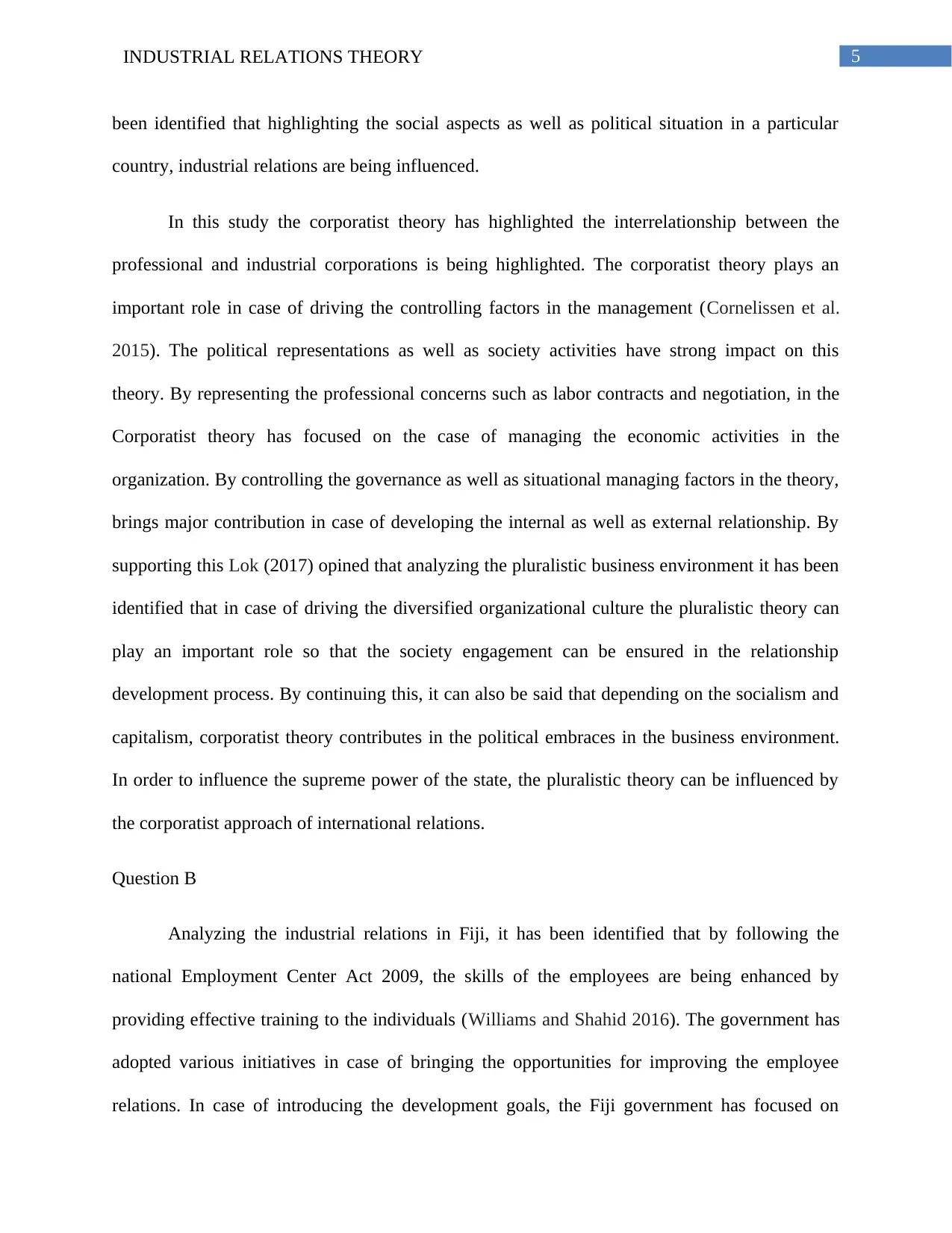
5INDUSTRIAL RELATIONS THEORY
been identified that highlighting the social aspects as well as political situation in a particular
country, industrial relations are being influenced.
In this study the corporatist theory has highlighted the interrelationship between the
professional and industrial corporations is being highlighted. The corporatist theory plays an
important role in case of driving the controlling factors in the management (Cornelissen et al.
2015). The political representations as well as society activities have strong impact on this
theory. By representing the professional concerns such as labor contracts and negotiation, in the
Corporatist theory has focused on the case of managing the economic activities in the
organization. By controlling the governance as well as situational managing factors in the theory,
brings major contribution in case of developing the internal as well as external relationship. By
supporting this Lok (2017) opined that analyzing the pluralistic business environment it has been
identified that in case of driving the diversified organizational culture the pluralistic theory can
play an important role so that the society engagement can be ensured in the relationship
development process. By continuing this, it can also be said that depending on the socialism and
capitalism, corporatist theory contributes in the political embraces in the business environment.
In order to influence the supreme power of the state, the pluralistic theory can be influenced by
the corporatist approach of international relations.
Question B
Analyzing the industrial relations in Fiji, it has been identified that by following the
national Employment Center Act 2009, the skills of the employees are being enhanced by
providing effective training to the individuals (Williams and Shahid 2016). The government has
adopted various initiatives in case of bringing the opportunities for improving the employee
relations. In case of introducing the development goals, the Fiji government has focused on
been identified that highlighting the social aspects as well as political situation in a particular
country, industrial relations are being influenced.
In this study the corporatist theory has highlighted the interrelationship between the
professional and industrial corporations is being highlighted. The corporatist theory plays an
important role in case of driving the controlling factors in the management (Cornelissen et al.
2015). The political representations as well as society activities have strong impact on this
theory. By representing the professional concerns such as labor contracts and negotiation, in the
Corporatist theory has focused on the case of managing the economic activities in the
organization. By controlling the governance as well as situational managing factors in the theory,
brings major contribution in case of developing the internal as well as external relationship. By
supporting this Lok (2017) opined that analyzing the pluralistic business environment it has been
identified that in case of driving the diversified organizational culture the pluralistic theory can
play an important role so that the society engagement can be ensured in the relationship
development process. By continuing this, it can also be said that depending on the socialism and
capitalism, corporatist theory contributes in the political embraces in the business environment.
In order to influence the supreme power of the state, the pluralistic theory can be influenced by
the corporatist approach of international relations.
Question B
Analyzing the industrial relations in Fiji, it has been identified that by following the
national Employment Center Act 2009, the skills of the employees are being enhanced by
providing effective training to the individuals (Williams and Shahid 2016). The government has
adopted various initiatives in case of bringing the opportunities for improving the employee
relations. In case of introducing the development goals, the Fiji government has focused on
⊘ This is a preview!⊘
Do you want full access?
Subscribe today to unlock all pages.

Trusted by 1+ million students worldwide
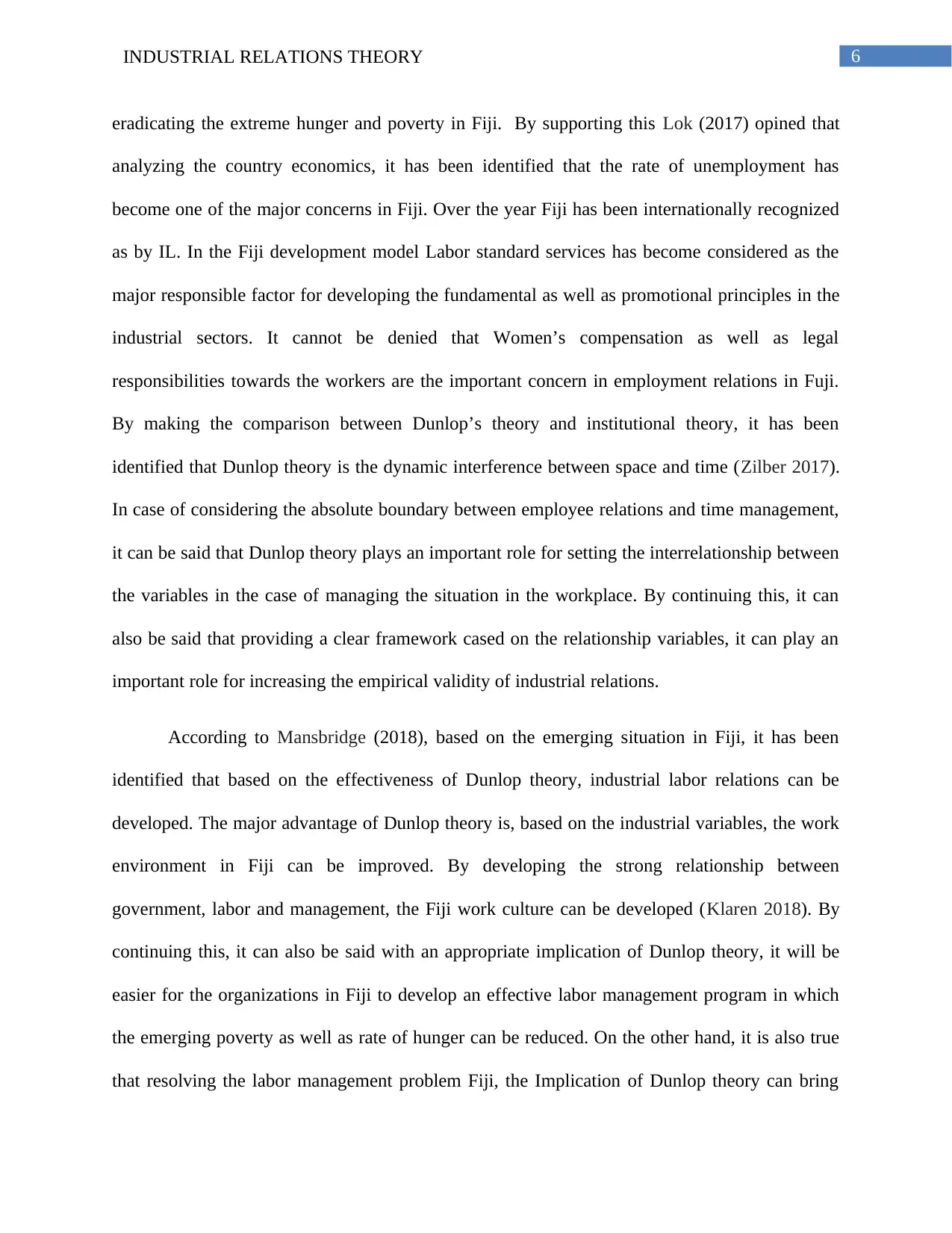
6INDUSTRIAL RELATIONS THEORY
eradicating the extreme hunger and poverty in Fiji. By supporting this Lok (2017) opined that
analyzing the country economics, it has been identified that the rate of unemployment has
become one of the major concerns in Fiji. Over the year Fiji has been internationally recognized
as by IL. In the Fiji development model Labor standard services has become considered as the
major responsible factor for developing the fundamental as well as promotional principles in the
industrial sectors. It cannot be denied that Women’s compensation as well as legal
responsibilities towards the workers are the important concern in employment relations in Fuji.
By making the comparison between Dunlop’s theory and institutional theory, it has been
identified that Dunlop theory is the dynamic interference between space and time (Zilber 2017).
In case of considering the absolute boundary between employee relations and time management,
it can be said that Dunlop theory plays an important role for setting the interrelationship between
the variables in the case of managing the situation in the workplace. By continuing this, it can
also be said that providing a clear framework cased on the relationship variables, it can play an
important role for increasing the empirical validity of industrial relations.
According to Mansbridge (2018), based on the emerging situation in Fiji, it has been
identified that based on the effectiveness of Dunlop theory, industrial labor relations can be
developed. The major advantage of Dunlop theory is, based on the industrial variables, the work
environment in Fiji can be improved. By developing the strong relationship between
government, labor and management, the Fiji work culture can be developed (Klaren 2018). By
continuing this, it can also be said with an appropriate implication of Dunlop theory, it will be
easier for the organizations in Fiji to develop an effective labor management program in which
the emerging poverty as well as rate of hunger can be reduced. On the other hand, it is also true
that resolving the labor management problem Fiji, the Implication of Dunlop theory can bring
eradicating the extreme hunger and poverty in Fiji. By supporting this Lok (2017) opined that
analyzing the country economics, it has been identified that the rate of unemployment has
become one of the major concerns in Fiji. Over the year Fiji has been internationally recognized
as by IL. In the Fiji development model Labor standard services has become considered as the
major responsible factor for developing the fundamental as well as promotional principles in the
industrial sectors. It cannot be denied that Women’s compensation as well as legal
responsibilities towards the workers are the important concern in employment relations in Fuji.
By making the comparison between Dunlop’s theory and institutional theory, it has been
identified that Dunlop theory is the dynamic interference between space and time (Zilber 2017).
In case of considering the absolute boundary between employee relations and time management,
it can be said that Dunlop theory plays an important role for setting the interrelationship between
the variables in the case of managing the situation in the workplace. By continuing this, it can
also be said that providing a clear framework cased on the relationship variables, it can play an
important role for increasing the empirical validity of industrial relations.
According to Mansbridge (2018), based on the emerging situation in Fiji, it has been
identified that based on the effectiveness of Dunlop theory, industrial labor relations can be
developed. The major advantage of Dunlop theory is, based on the industrial variables, the work
environment in Fiji can be improved. By developing the strong relationship between
government, labor and management, the Fiji work culture can be developed (Klaren 2018). By
continuing this, it can also be said with an appropriate implication of Dunlop theory, it will be
easier for the organizations in Fiji to develop an effective labor management program in which
the emerging poverty as well as rate of hunger can be reduced. On the other hand, it is also true
that resolving the labor management problem Fiji, the Implication of Dunlop theory can bring
Paraphrase This Document
Need a fresh take? Get an instant paraphrase of this document with our AI Paraphraser
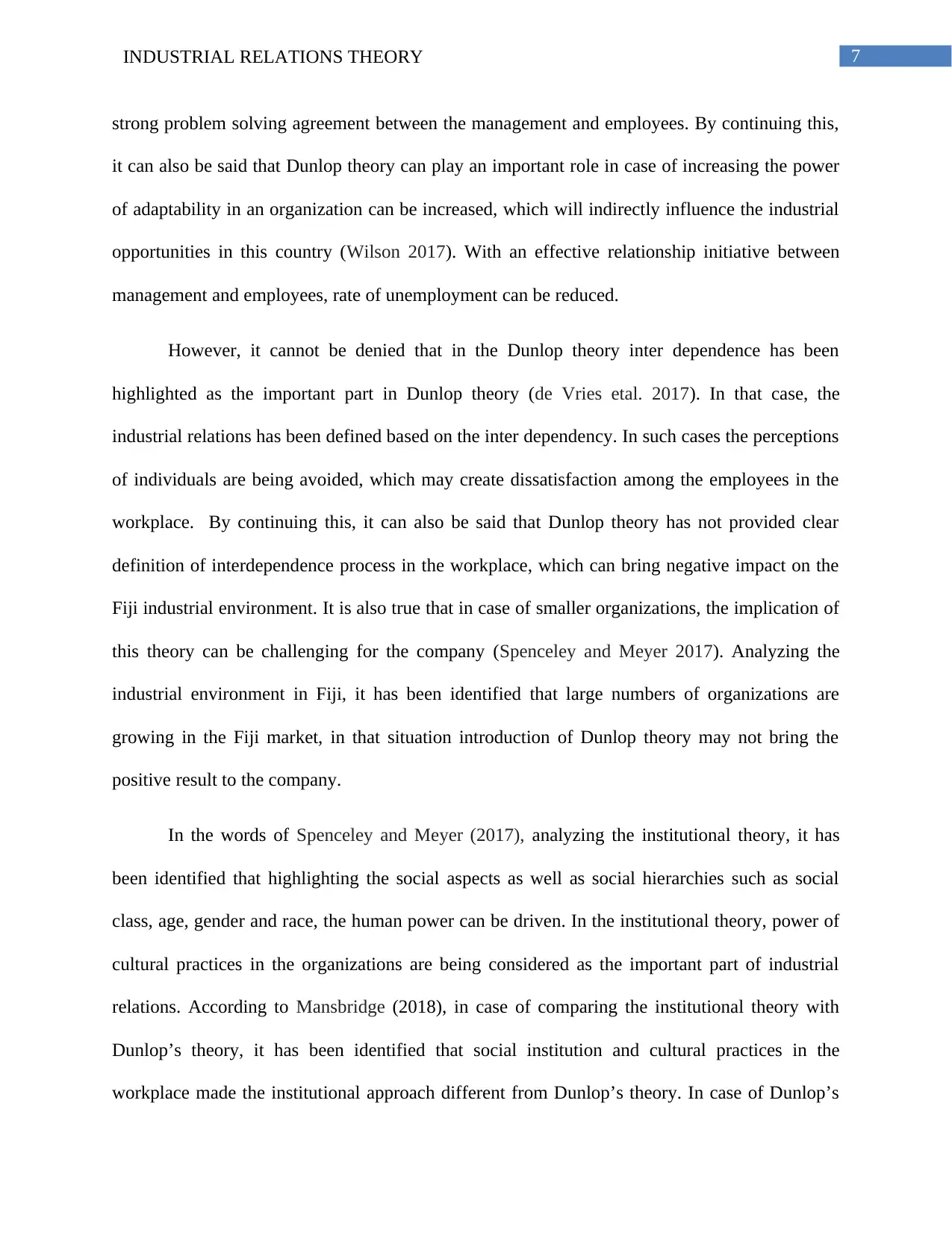
7INDUSTRIAL RELATIONS THEORY
strong problem solving agreement between the management and employees. By continuing this,
it can also be said that Dunlop theory can play an important role in case of increasing the power
of adaptability in an organization can be increased, which will indirectly influence the industrial
opportunities in this country (Wilson 2017). With an effective relationship initiative between
management and employees, rate of unemployment can be reduced.
However, it cannot be denied that in the Dunlop theory inter dependence has been
highlighted as the important part in Dunlop theory (de Vries etal. 2017). In that case, the
industrial relations has been defined based on the inter dependency. In such cases the perceptions
of individuals are being avoided, which may create dissatisfaction among the employees in the
workplace. By continuing this, it can also be said that Dunlop theory has not provided clear
definition of interdependence process in the workplace, which can bring negative impact on the
Fiji industrial environment. It is also true that in case of smaller organizations, the implication of
this theory can be challenging for the company (Spenceley and Meyer 2017). Analyzing the
industrial environment in Fiji, it has been identified that large numbers of organizations are
growing in the Fiji market, in that situation introduction of Dunlop theory may not bring the
positive result to the company.
In the words of Spenceley and Meyer (2017), analyzing the institutional theory, it has
been identified that highlighting the social aspects as well as social hierarchies such as social
class, age, gender and race, the human power can be driven. In the institutional theory, power of
cultural practices in the organizations are being considered as the important part of industrial
relations. According to Mansbridge (2018), in case of comparing the institutional theory with
Dunlop’s theory, it has been identified that social institution and cultural practices in the
workplace made the institutional approach different from Dunlop’s theory. In case of Dunlop’s
strong problem solving agreement between the management and employees. By continuing this,
it can also be said that Dunlop theory can play an important role in case of increasing the power
of adaptability in an organization can be increased, which will indirectly influence the industrial
opportunities in this country (Wilson 2017). With an effective relationship initiative between
management and employees, rate of unemployment can be reduced.
However, it cannot be denied that in the Dunlop theory inter dependence has been
highlighted as the important part in Dunlop theory (de Vries etal. 2017). In that case, the
industrial relations has been defined based on the inter dependency. In such cases the perceptions
of individuals are being avoided, which may create dissatisfaction among the employees in the
workplace. By continuing this, it can also be said that Dunlop theory has not provided clear
definition of interdependence process in the workplace, which can bring negative impact on the
Fiji industrial environment. It is also true that in case of smaller organizations, the implication of
this theory can be challenging for the company (Spenceley and Meyer 2017). Analyzing the
industrial environment in Fiji, it has been identified that large numbers of organizations are
growing in the Fiji market, in that situation introduction of Dunlop theory may not bring the
positive result to the company.
In the words of Spenceley and Meyer (2017), analyzing the institutional theory, it has
been identified that highlighting the social aspects as well as social hierarchies such as social
class, age, gender and race, the human power can be driven. In the institutional theory, power of
cultural practices in the organizations are being considered as the important part of industrial
relations. According to Mansbridge (2018), in case of comparing the institutional theory with
Dunlop’s theory, it has been identified that social institution and cultural practices in the
workplace made the institutional approach different from Dunlop’s theory. In case of Dunlop’s
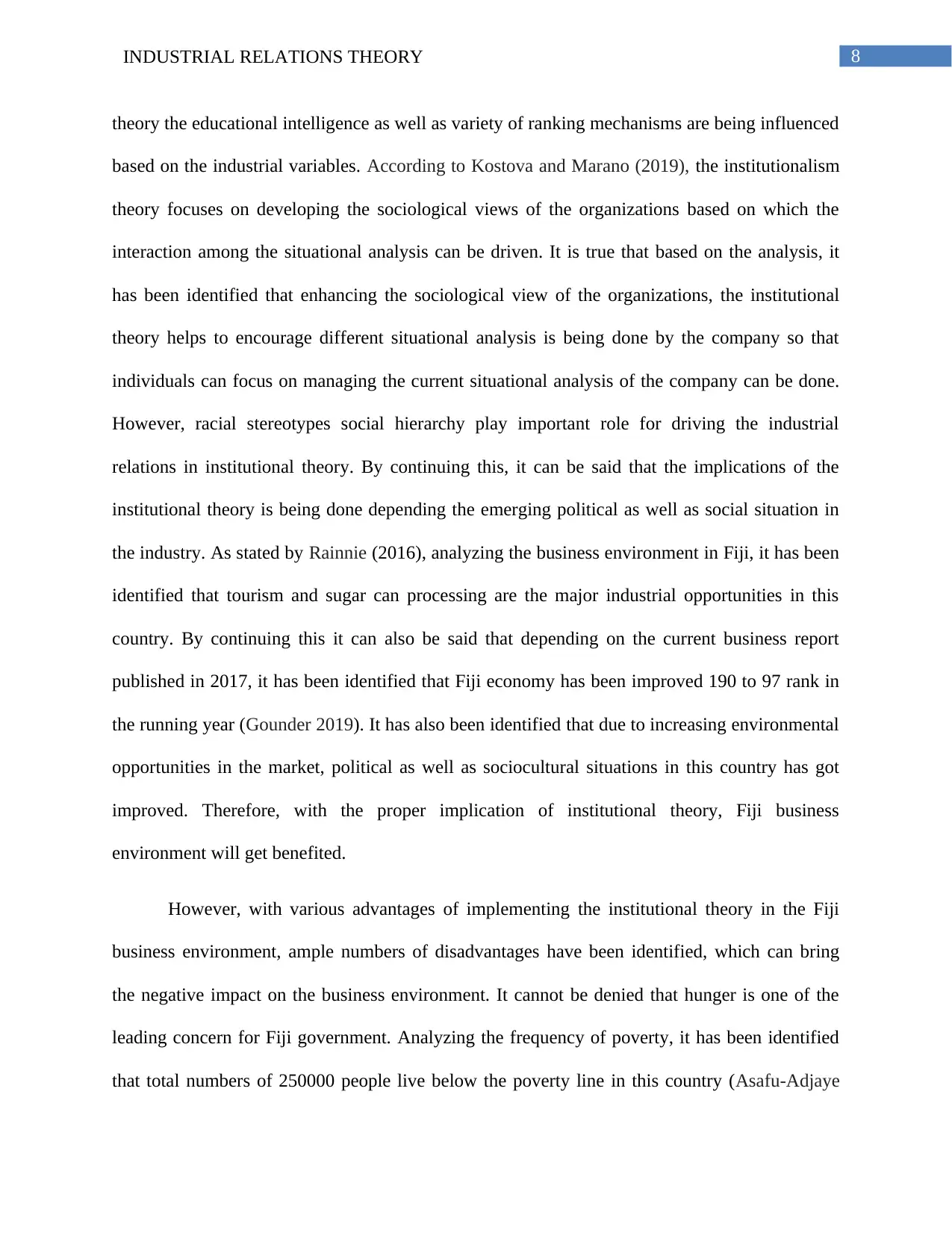
8INDUSTRIAL RELATIONS THEORY
theory the educational intelligence as well as variety of ranking mechanisms are being influenced
based on the industrial variables. According to Kostova and Marano (2019), the institutionalism
theory focuses on developing the sociological views of the organizations based on which the
interaction among the situational analysis can be driven. It is true that based on the analysis, it
has been identified that enhancing the sociological view of the organizations, the institutional
theory helps to encourage different situational analysis is being done by the company so that
individuals can focus on managing the current situational analysis of the company can be done.
However, racial stereotypes social hierarchy play important role for driving the industrial
relations in institutional theory. By continuing this, it can be said that the implications of the
institutional theory is being done depending the emerging political as well as social situation in
the industry. As stated by Rainnie (2016), analyzing the business environment in Fiji, it has been
identified that tourism and sugar can processing are the major industrial opportunities in this
country. By continuing this it can also be said that depending on the current business report
published in 2017, it has been identified that Fiji economy has been improved 190 to 97 rank in
the running year (Gounder 2019). It has also been identified that due to increasing environmental
opportunities in the market, political as well as sociocultural situations in this country has got
improved. Therefore, with the proper implication of institutional theory, Fiji business
environment will get benefited.
However, with various advantages of implementing the institutional theory in the Fiji
business environment, ample numbers of disadvantages have been identified, which can bring
the negative impact on the business environment. It cannot be denied that hunger is one of the
leading concern for Fiji government. Analyzing the frequency of poverty, it has been identified
that total numbers of 250000 people live below the poverty line in this country (Asafu-Adjaye
theory the educational intelligence as well as variety of ranking mechanisms are being influenced
based on the industrial variables. According to Kostova and Marano (2019), the institutionalism
theory focuses on developing the sociological views of the organizations based on which the
interaction among the situational analysis can be driven. It is true that based on the analysis, it
has been identified that enhancing the sociological view of the organizations, the institutional
theory helps to encourage different situational analysis is being done by the company so that
individuals can focus on managing the current situational analysis of the company can be done.
However, racial stereotypes social hierarchy play important role for driving the industrial
relations in institutional theory. By continuing this, it can be said that the implications of the
institutional theory is being done depending the emerging political as well as social situation in
the industry. As stated by Rainnie (2016), analyzing the business environment in Fiji, it has been
identified that tourism and sugar can processing are the major industrial opportunities in this
country. By continuing this it can also be said that depending on the current business report
published in 2017, it has been identified that Fiji economy has been improved 190 to 97 rank in
the running year (Gounder 2019). It has also been identified that due to increasing environmental
opportunities in the market, political as well as sociocultural situations in this country has got
improved. Therefore, with the proper implication of institutional theory, Fiji business
environment will get benefited.
However, with various advantages of implementing the institutional theory in the Fiji
business environment, ample numbers of disadvantages have been identified, which can bring
the negative impact on the business environment. It cannot be denied that hunger is one of the
leading concern for Fiji government. Analyzing the frequency of poverty, it has been identified
that total numbers of 250000 people live below the poverty line in this country (Asafu-Adjaye
⊘ This is a preview!⊘
Do you want full access?
Subscribe today to unlock all pages.

Trusted by 1+ million students worldwide
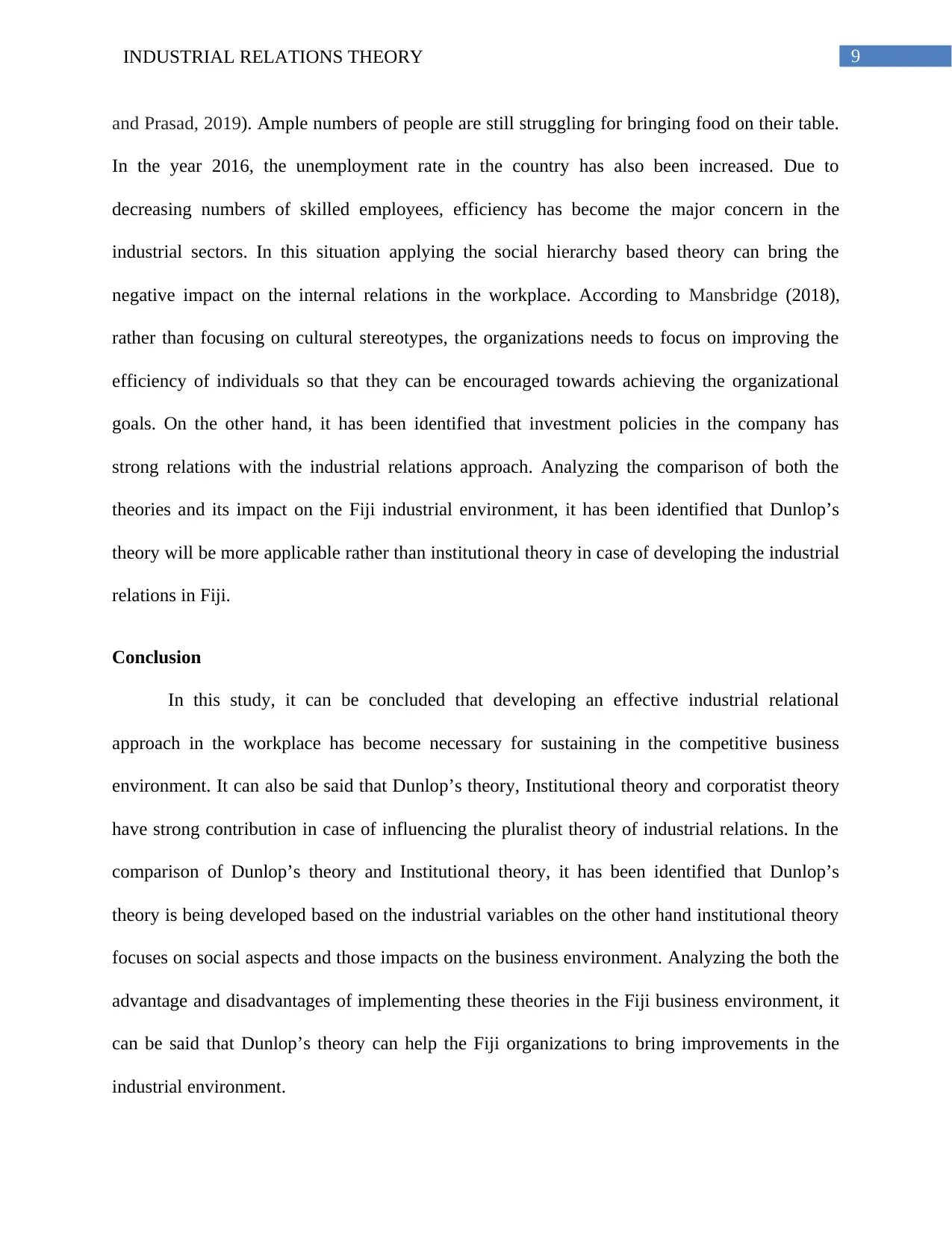
9INDUSTRIAL RELATIONS THEORY
and Prasad, 2019). Ample numbers of people are still struggling for bringing food on their table.
In the year 2016, the unemployment rate in the country has also been increased. Due to
decreasing numbers of skilled employees, efficiency has become the major concern in the
industrial sectors. In this situation applying the social hierarchy based theory can bring the
negative impact on the internal relations in the workplace. According to Mansbridge (2018),
rather than focusing on cultural stereotypes, the organizations needs to focus on improving the
efficiency of individuals so that they can be encouraged towards achieving the organizational
goals. On the other hand, it has been identified that investment policies in the company has
strong relations with the industrial relations approach. Analyzing the comparison of both the
theories and its impact on the Fiji industrial environment, it has been identified that Dunlop’s
theory will be more applicable rather than institutional theory in case of developing the industrial
relations in Fiji.
Conclusion
In this study, it can be concluded that developing an effective industrial relational
approach in the workplace has become necessary for sustaining in the competitive business
environment. It can also be said that Dunlop’s theory, Institutional theory and corporatist theory
have strong contribution in case of influencing the pluralist theory of industrial relations. In the
comparison of Dunlop’s theory and Institutional theory, it has been identified that Dunlop’s
theory is being developed based on the industrial variables on the other hand institutional theory
focuses on social aspects and those impacts on the business environment. Analyzing the both the
advantage and disadvantages of implementing these theories in the Fiji business environment, it
can be said that Dunlop’s theory can help the Fiji organizations to bring improvements in the
industrial environment.
and Prasad, 2019). Ample numbers of people are still struggling for bringing food on their table.
In the year 2016, the unemployment rate in the country has also been increased. Due to
decreasing numbers of skilled employees, efficiency has become the major concern in the
industrial sectors. In this situation applying the social hierarchy based theory can bring the
negative impact on the internal relations in the workplace. According to Mansbridge (2018),
rather than focusing on cultural stereotypes, the organizations needs to focus on improving the
efficiency of individuals so that they can be encouraged towards achieving the organizational
goals. On the other hand, it has been identified that investment policies in the company has
strong relations with the industrial relations approach. Analyzing the comparison of both the
theories and its impact on the Fiji industrial environment, it has been identified that Dunlop’s
theory will be more applicable rather than institutional theory in case of developing the industrial
relations in Fiji.
Conclusion
In this study, it can be concluded that developing an effective industrial relational
approach in the workplace has become necessary for sustaining in the competitive business
environment. It can also be said that Dunlop’s theory, Institutional theory and corporatist theory
have strong contribution in case of influencing the pluralist theory of industrial relations. In the
comparison of Dunlop’s theory and Institutional theory, it has been identified that Dunlop’s
theory is being developed based on the industrial variables on the other hand institutional theory
focuses on social aspects and those impacts on the business environment. Analyzing the both the
advantage and disadvantages of implementing these theories in the Fiji business environment, it
can be said that Dunlop’s theory can help the Fiji organizations to bring improvements in the
industrial environment.
Paraphrase This Document
Need a fresh take? Get an instant paraphrase of this document with our AI Paraphraser
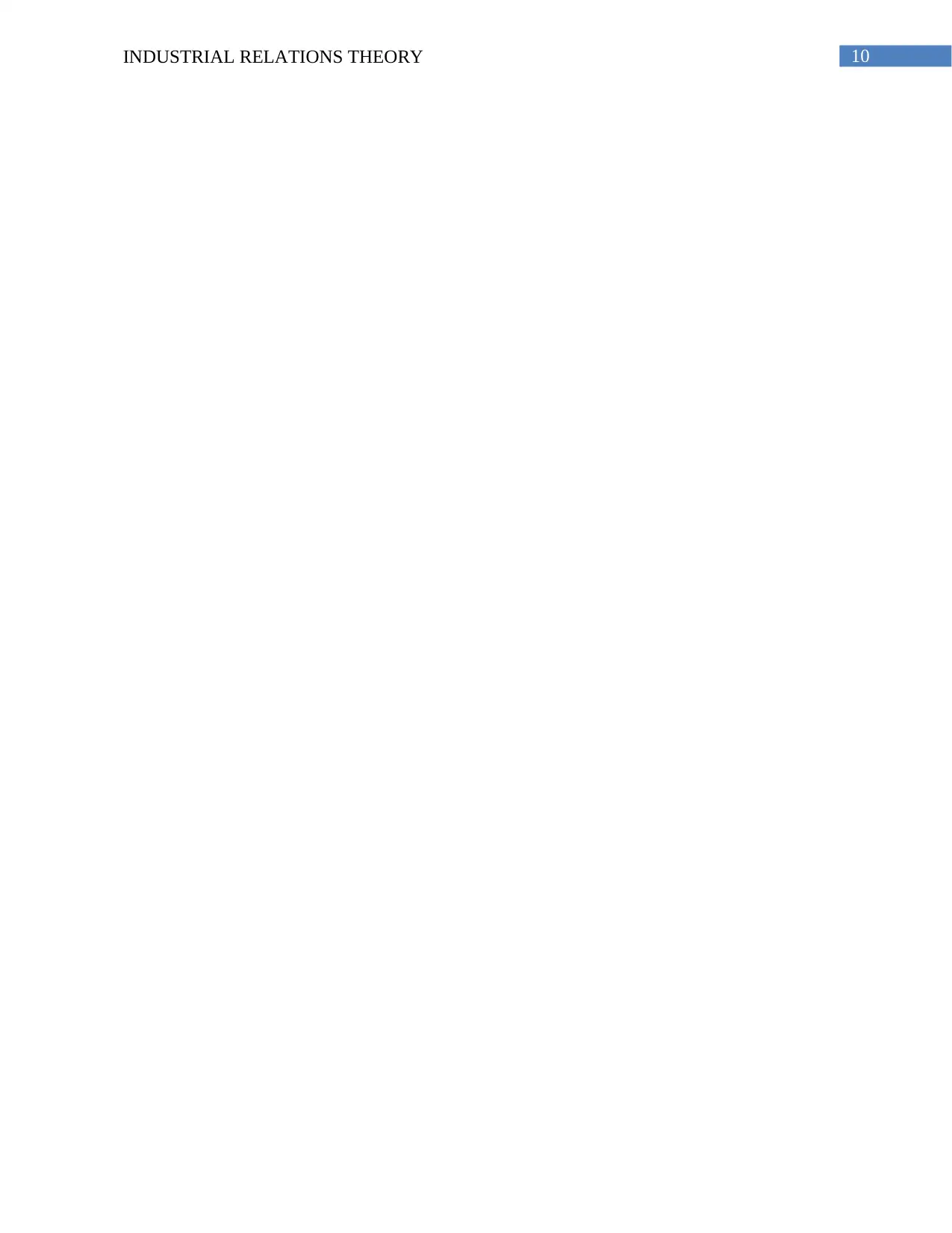
10INDUSTRIAL RELATIONS THEORY
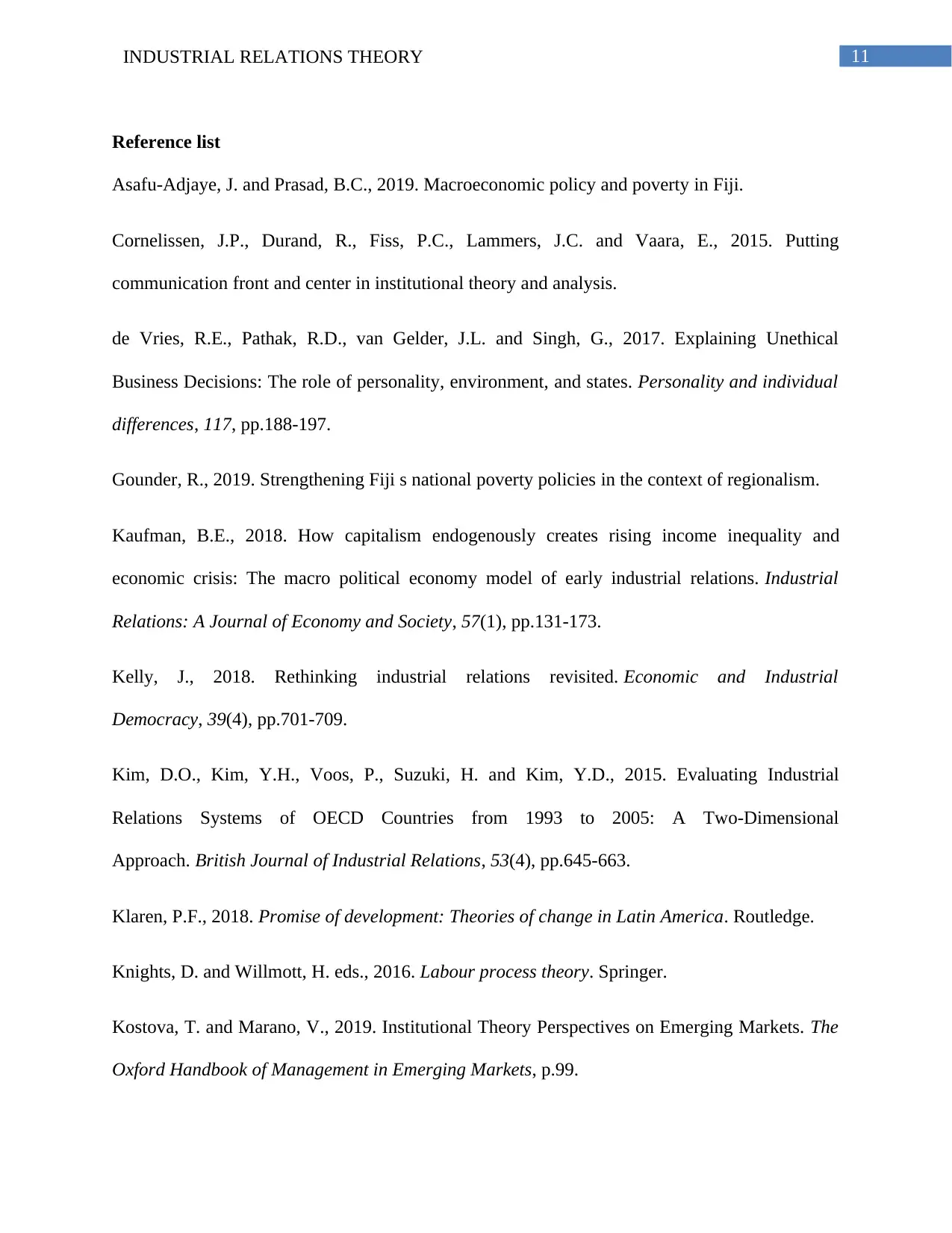
11INDUSTRIAL RELATIONS THEORY
Reference list
Asafu-Adjaye, J. and Prasad, B.C., 2019. Macroeconomic policy and poverty in Fiji.
Cornelissen, J.P., Durand, R., Fiss, P.C., Lammers, J.C. and Vaara, E., 2015. Putting
communication front and center in institutional theory and analysis.
de Vries, R.E., Pathak, R.D., van Gelder, J.L. and Singh, G., 2017. Explaining Unethical
Business Decisions: The role of personality, environment, and states. Personality and individual
differences, 117, pp.188-197.
Gounder, R., 2019. Strengthening Fiji s national poverty policies in the context of regionalism.
Kaufman, B.E., 2018. How capitalism endogenously creates rising income inequality and
economic crisis: The macro political economy model of early industrial relations. Industrial
Relations: A Journal of Economy and Society, 57(1), pp.131-173.
Kelly, J., 2018. Rethinking industrial relations revisited. Economic and Industrial
Democracy, 39(4), pp.701-709.
Kim, D.O., Kim, Y.H., Voos, P., Suzuki, H. and Kim, Y.D., 2015. Evaluating Industrial
Relations Systems of OECD Countries from 1993 to 2005: A Two‐Dimensional
Approach. British Journal of Industrial Relations, 53(4), pp.645-663.
Klaren, P.F., 2018. Promise of development: Theories of change in Latin America. Routledge.
Knights, D. and Willmott, H. eds., 2016. Labour process theory. Springer.
Kostova, T. and Marano, V., 2019. Institutional Theory Perspectives on Emerging Markets. The
Oxford Handbook of Management in Emerging Markets, p.99.
Reference list
Asafu-Adjaye, J. and Prasad, B.C., 2019. Macroeconomic policy and poverty in Fiji.
Cornelissen, J.P., Durand, R., Fiss, P.C., Lammers, J.C. and Vaara, E., 2015. Putting
communication front and center in institutional theory and analysis.
de Vries, R.E., Pathak, R.D., van Gelder, J.L. and Singh, G., 2017. Explaining Unethical
Business Decisions: The role of personality, environment, and states. Personality and individual
differences, 117, pp.188-197.
Gounder, R., 2019. Strengthening Fiji s national poverty policies in the context of regionalism.
Kaufman, B.E., 2018. How capitalism endogenously creates rising income inequality and
economic crisis: The macro political economy model of early industrial relations. Industrial
Relations: A Journal of Economy and Society, 57(1), pp.131-173.
Kelly, J., 2018. Rethinking industrial relations revisited. Economic and Industrial
Democracy, 39(4), pp.701-709.
Kim, D.O., Kim, Y.H., Voos, P., Suzuki, H. and Kim, Y.D., 2015. Evaluating Industrial
Relations Systems of OECD Countries from 1993 to 2005: A Two‐Dimensional
Approach. British Journal of Industrial Relations, 53(4), pp.645-663.
Klaren, P.F., 2018. Promise of development: Theories of change in Latin America. Routledge.
Knights, D. and Willmott, H. eds., 2016. Labour process theory. Springer.
Kostova, T. and Marano, V., 2019. Institutional Theory Perspectives on Emerging Markets. The
Oxford Handbook of Management in Emerging Markets, p.99.
⊘ This is a preview!⊘
Do you want full access?
Subscribe today to unlock all pages.

Trusted by 1+ million students worldwide
1 out of 13
Related Documents
Your All-in-One AI-Powered Toolkit for Academic Success.
+13062052269
info@desklib.com
Available 24*7 on WhatsApp / Email
![[object Object]](/_next/static/media/star-bottom.7253800d.svg)
Unlock your academic potential
Copyright © 2020–2026 A2Z Services. All Rights Reserved. Developed and managed by ZUCOL.




